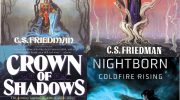 We have talked to lifelong animation fan and freelance writer David Perlmutter. He has published short fiction in a variety of genres for various magazines and anthologies, as well as essays on his favorite topics for similar publishers.
We have talked to lifelong animation fan and freelance writer David Perlmutter. He has published short fiction in a variety of genres for various magazines and anthologies, as well as essays on his favorite topics for similar publishers.
First of all tell us a bit about your short stories, do you have any personal favourites?
You can’t really answer that question without slighting some aspect of your work. If any aspect of my work is considered to be “better” than some other aspect, I leave that to other people to decide, specifically the readers and any award giving bodies at all interested in what I have to offer. However, I do have a fondness for my series characters, otherwise I wouldn’t have written so much about them. Or contemplating writing novels about them, for that matter.
Of the stories of mine recently that don’t belong to any series, I would say “The Toontown Riots of 1949”, which is due to be reprinted soon in the Canadian ebook series “Collidor”, and “The Princess Murder Case”, which came out in the anthology “Cosmic Vegetables” a couple of years ago, probably show me at my best.
How do go about submitting your stories to anthologies and magazines? Do you already have the stories or do you write specifically for an anthology you want to be included in?
At first, it was about writing the stories and see who would take them. But I eventually figured out that, if I could prove myself by writing to anthology themes and concepts, editors and publishers would take me more seriously, and be willing to accept more independently-conceived ideas. That’s how it’s been for the past few years, and it’s worked out, in terms of getting published. Not so much in terms of getting “name” recognition. But I imagine that will change if I ever make the sale requirements to join SFWA, which has been my recent desire.
You’re also working on your first novel, Orthicon. Can you tell us a bit about that project?
That, thankfully, has been finished and sold. It’s scheduled to come out through an independent company called Linkville Press based in Oregon, as soon as the house editor gets through looking it over.
I’m an avid fan of television animation, and have largely deplored the fact that there is very little written about it that can be considered objective scholarship. I tried to fill that gap with my book “America ‘Toons In”, which was published by McFarland and Co. in 2014. However, there’s a lot of things you can’t say in an objective academic work. You are capable of saying those things in a novel, though, especially in roman a clef fashion, which is a lot of what “Orthicon” is. I was trying to address the fact that television animation is largely ignored by the cultural and academic elite despite its enormous influence on the public, and also an attempt to develop the idea of animated characters being part of a larger, united community rather than simply being characters in unconnected programs. Particularly, as well, what it would mean for America and the world if they were truly real and not figments of people’s imaginations.
I think people have a complicated relationship with television. We advocate the medium as a great democratizing force, but we demean the products of it as lowbrow and without redeeming value based on extremely scarce evidence. The producers, networks and cable channels, which are often the same thing now, do us little favour in this regard. They give us shows, cancel them, and expect us to continue to view their replacements. What they don’t realize is that the cancelled shows had people who sweated blood to dream them up, like I do for all of my stories. And they have fans- people for whom these programs were a major part of their life they can’t get back, and for whom the characters were as real to them as their friends and family, so the shows’ cancellation seemed almost like a mass assassination to them. For example: the Bronies. My Little Pony: Friendship Is Magic was not meant for adult men by any means, but these adult men found something there that enriched their lives, and they’re proud to admit it. I applaud them for that, because I’m a bit too cowardly to do that on my own.
And, of course, if you view something as a thing to be bartered or traded in rather than something with ideas, opinions or personalities that others find value in, you can do the worst things to them and have no regrets. The most extreme example of this would definitely be what the Nazis did to the Jews of Europe. I’m not saying by any means that that is how Nickelodeon, Cartoon Network or Disney’s executives view their animated programs, but the manner in which they cavalierly bring them to life, have them around, and then cancel them comes close sometimes. The Simpsons and Family Guy excepted, most television animation programs don’t last much beyond 26 installments. Even though, personally, I dearly wish that many of my favourites had lasted longer than that. Much longer, in some cases. So Orthicon, and the Cartoon Republican Army cycle, has been my way of trying to cope with sudden forms of loss in my life, to artificially prolong these abruptly curtailed lives in the best way I know how.
9/11 and America’s (over)-reaction to it started the wheels in my head moving, and the growing backlash against Islam and its practitioners from those knowing nothing about it formulated what approach I should take. As well, given that I have an M.A. degree in History, I was able to spend a lot of time looking at the history of the United States, and was able to discover that this kind of thing is not new. It actually has replicated across the country’s history, with different peoples serving as targets over time in varying degrees because they were “different”. And no one would be seen as “more” different than America’s limited Caucasian-centric idea of “normal” than animated cartoon characters. So everything just fit together perfectly, and I was eventually able to assemble it all into a full narrative.
In some countries I’m more familiar with (Norway and Japan) locally produced TV-series tend to be more concluding with x number of episodes and you know the end is the end and there are no cliffhanger endings. Do you feel this “cash is king” cancellation approach to series is a bit of an American phenomena?
Definitely. American show business has always been financed by personal greed, film and television in particular. It’s a particularity of the way America as a whole works as well, for good or ill. The major difference with America is that, PBS excepted, there is no government-funded television programming. It’s all private sector and private interests, and thus funded, in a way, by private greed at the top. This is, though, as you say, unique to America. Other countries do not have private media to the same degree, in part because their populations are much smaller than America’s, and what production there is funded by federal or state governments in whole or in part. In my home country of Canada, production is funded on this model. The government will provide a certain amount of funding to projects, and their producers have to come up with the rest. And, because neither the Canadian government nor the Canadian film/television industry is as rich as Hollywood, not as much gets produced in terms of quantity, or, as in a lot of cases, quality. With the bad stuff, it’s a bit like the “quota quickies” American film studios used to produce in Britain to comply with import quotas in the early 20th century- done because you have to, not because you want to. It’s usually if you want to do it that the quality emerges.
When did you know that you wanted to be a writer?
Pretty early in life. I always had an attraction to narrative media, and wanted to be involved in it in one form or another. I just wasn’t sure about how to accomplish it. Originally, I wanted to be a television animation producer, and I tried to go about preparing work as I read how others had prepared shows: developing “bibles”, creating characters and plots, and trying to draw models of what the characters would look like. But, eventually, I realized that, because I wanted to stay in Winnipeg, I wasn’t going to get far in an industry based in Los Angeles. Besides, I lacked the one skill necessary to be an animator: drawing.
So, when I discovered the existence of fiction magazine, and that you could make money writing things in your spare time instead of going through the onerous process of trying to sell television series, that became my main outlet. Aside from pursuing my non-fiction studies, and, eventually, publishing non-fiction professionally. But I think they balance each other out. Studying television animation has given me a great understanding of how to build a successful brand as an author, what kind of audiences my work would be best aimed at, and how not to offend people while I tell stories. To say nothing of how it has influenced my characterization and plotting.
How different do you feel writing a whole novel is compared to shorter fiction?
More work and more effort are involved with novels. A story can be any length you choose it to be, and you can do it any time you want. With a novel, though, you really have to have a plan before you start writing, and stick to that plan. You can’t travel somewhere on your own without a map, or you’ll get lost.
Can you tell us a bit about your writing process? What is your favorite and least favorite part, and why?
The best part of it is conceptualizing it in my head and then, after a bit of thought, putting it on paper. This is the last stage of it that it’s still “mine” before I have to give it up to the world, so I want to make sure that everything is in place before I go ahead.
The worst part is typing. I learned how to type in high school, and so I do that for all of my stuff. But it can be tedious and sometimes stressful. Because you can check the word count on a computer, you sometimes find the story isn’t as long or short as you thought it was or needs to be, and you might have to do surgery on it then and there. I don’t want to spend hours doing something that should only take minutes.
Would you agree that short stories seem to give authors a way to experiment more compared to novels?
Yes. Novels confine authors into formats and formulas that they’re supposed to follow to the letter, generally. As I said before, a story can be anything the author wants it to be. Even if it ends up being the weirdest or scariest thing imaginable.
How do you go about the marketing aspect and especially related to your online presence? Anything you’ve seen work better than other things?
My online presence right now is chiefly my accounts on Facebook, Twitter, LinkedIn and Tumblr. I’ve limited myself chiefly to just making announcements when I’ve made a sale or if I have something coming out, although occasionally I put the odd comment on Facebook if it seems appropriate. I think this has worked out for me, because nobody wants to be bombarded with useless posts on a daily basis from people who largely are acquaintances rather than true “friends”. Even when I haven’t put anything online for a while, I’ll still get requests to connect, and I feel good about that.
What do you do when you’re not writing? Any favourite hobbies?
I enjoy reading, doing research on the computer, watching television and listening to music. I’m pretty old school in a lot of ways. I prefer paper to e-, I still have the same old Panasonic TV set I bought nearly 20 years ago, and I much prefer the rich, smooth sound of the CD to anything a download or streaming service could offer. Those things are really made for young people, and being 35 now, I don’t think I qualify as “young” anymore.
Do you have a dream for your writing career?
Just that people know who I am, have read my books, and can tell me that they made a difference in their lives. And also to earn just enough money so that I never have to worry about it again. Since I worry about money a lot, that’d take a lot off my mind.
What’s next? Do you have more exciting new projects you’re working on?
I am in the process of trying to prepare some new non-fiction projects. One is a projected volume on American television animation for the Rough Guide series, which would kind of be an encyclopedia companion to “America ‘Toons In”, except I would be able to discuss some more recent material as well (instead of having to wait to update “America” in a few years, like I plan to do). Another is a volume of biographical profiles covering another great passion of mine, American rhythm and blues music. Both are in the proposal stage, so don’t expect sale announcements, if they come, for these for a while. I also want to continue my relationship with McFarland by writing histories of important television animation series. This would start with “The Powerpuff Girls”, and then “My Life As A Teenage Robot”, and then, who knows what?
Fiction wise, I keep following the money, anthology-wise, on Duotrope and Ralan. However, I am trying to interest publishers in full-length adventures of some of my series. I plan on writing some origin adventures targeted to appropriate age groups. Muscle Girl, for example, would be targeted to elementary-aged kids, since that’s what she is. Jefferson Ball, on the other end, would be for adult consumers, since that’s very much was she is- although in this sense I mean only slightly risque rather than erotic. Erotica is about the only thing I don’t want to try my hand in writing- I have no experience, so if I tried it, it wouldn’t come off as authentic. Which is what I think all writing needs to be to be truly successful.
* * * * * * *
Interview by Dag Rambraut – SFFWorld.com © 2016





